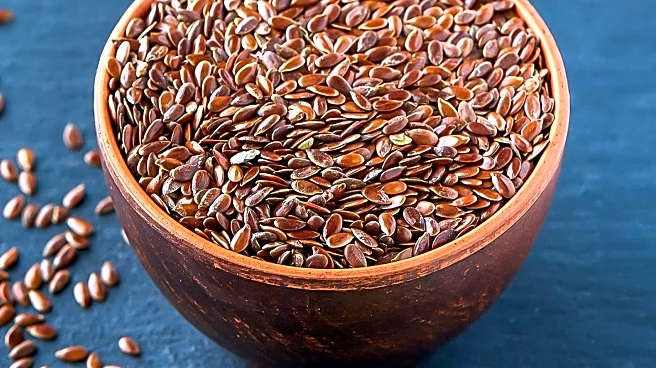What's Happening?
Nutritionists are highlighting the benefits of incorporating high-protein seeds into diets to boost energy, support gut health, and provide essential nutrients. Registered dietitian Elizabeth Sanchez emphasizes the importance of seeds like hemp, pumpkin, and sunflower, which are rich in protein and other nutrients. Hemp seeds, for instance, contain 32g of protein per 100g and are also high in omega-3 fatty acids, which help reduce inflammation. Pumpkin seeds offer 30g of protein per 100g and are a good source of magnesium, zinc, and iron. Sunflower seeds provide 24g of protein per 100g and are rich in vitamin E. These seeds not only contribute to protein intake but also offer healthy fats, fiber, vitamins, and minerals, making them a valuable addition to a balanced diet.
Why It's Important?
The inclusion of high-protein seeds in diets is significant due to their potential health benefits, particularly for those following plant-based diets or seeking to increase their protein intake without consuming animal products. These seeds help maintain muscle mass, balance hormones, and keep individuals fuller for longer periods. Additionally, they provide essential nutrients that support overall health, including heart health and inflammation reduction. As more people become health-conscious and seek sustainable dietary options, high-protein seeds offer a versatile and nutritious solution. This trend could influence food industry practices, encouraging the development of seed-based products and recipes.
What's Next?
As awareness of the benefits of high-protein seeds grows, it is likely that more consumers will incorporate them into their daily diets. This could lead to increased demand for these seeds in grocery stores and health food markets. Nutritionists and dietitians may continue to promote the use of seeds in various meals, from breakfast to dinner, to ensure a complete amino acid profile. The food industry might respond by creating new products that feature these seeds, catering to the needs of health-conscious consumers.
Beyond the Headlines
The shift towards incorporating high-protein seeds into diets reflects broader trends in health and wellness, including the move towards plant-based eating and the focus on nutrient-dense foods. This change also highlights the growing interest in sustainable and environmentally friendly food sources, as seeds require fewer resources to produce compared to animal-based proteins. Additionally, the emphasis on seeds aligns with the increasing demand for functional foods that offer specific health benefits beyond basic nutrition.









